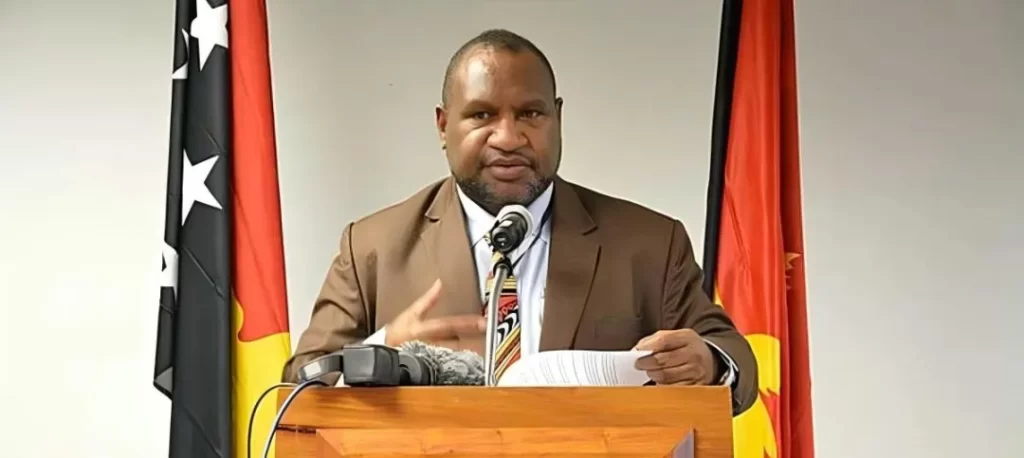On July 17 (local time), Prime Minister of Papua New Guinea (PNG), Hon. James Marape, returned to Port Moresby after completing a two-week official visit to the United States and the United Kingdom.
During the visit, Prime Minister Marape held a series of high-level meetings focused on climate change, resource development, investment cooperation, defense alignment, and economic recovery — a comprehensive push to advance national interests and mark PNG’s growing global presence as it approaches its 50th anniversary of independence.
Speaking at a press conference at Jacksons International Airport, Marape described the trip as “strategic and future-focused,” adding:
“This was a bridge-building journey — spiritually, economically, and diplomatically.
We return with stronger partnerships, increased investor confidence, and a signal of trust in PNG’s future from the international community.”
Address to the 62nd SDA General Conference: Calling on Churches to Support National Development
On July 5, Marape attended the 62nd General Conference Session of the Seventh-day Adventist Church (SDA) in St. Louis, USA, where he delivered brief remarks. He emphasized the church’s positive role in promoting national unity and social development, and expressed gratitude to the global SDA leadership for its long-standing support for PNG.
Meeting with King Charles III in the UK: Joint Focus on Climate and Rainforest Protection
On July 7, Prime Minister Marape met with His Majesty King Charles III at Highgrove House in Gloucestershire, UK. The two leaders engaged in in-depth discussions on climate change and the protection of tropical rainforests.
Marape stressed that PNG’s rainforests are “the planet’s oxygen bank and seed reserve,” vital to maintaining global climate balance. He urged the international community to value the traditional ecological knowledge of Indigenous peoples in natural resource management. The meeting also symbolized the enduring friendship and shared values between PNG and the UK as PNG celebrates 50 years of independence.
Energy Talks in Houston: Discussing LNG Development with Industry Leaders
On July 9, Prime Minister Marape met in Houston with ExxonMobil CEO Darren Woods, as well as representatives from TotalEnergies and Kumul Petroleum Holdings. Discussions focused on the development timeline of the Papua LNG, P’nyang LNG, and Wildebeest gas fields.
All parties reaffirmed their commitment to coordinated development, investor stability, and continuous infrastructure planning — aiming to generate significant employment for PNG nationals over the next 10 to 15 years.
Marape also highlighted that more Papua New Guineans are now working at ExxonMobil’s headquarters:
“This is a direct result of our early localization strategy.”
Condolences for Texas Flood Victims
During the visit, Marape expressed condolences to U.S. President Donald Trump, Texas Governor Greg Abbott, and the people affected by recent severe flooding in Central Texas, which caused over a hundred deaths. On behalf of the PNG government and people, he paid tribute to rescue workers and offered heartfelt solidarity with the American people.
High-Level Bilateral Meetings in Washington: Strengthening Regional Cooperation
On July 10, Marape held meetings in Washington, D.C. with U.S. Deputy Secretary of State Christopher Landau and other senior officials. Talks focused on investments in fisheries, hospitality, and energy, as well as defense and maritime cooperation, fuel security, and monitoring capacity development.
The U.S. confirmed its participation in PNG’s 50th Independence Anniversary celebrations this September, and both sides agreed to deepen regional joint ventures and multilateral cooperation.
Historic White House Meeting: Strategic Dialogue with Vice President J.D. Vance
Marape became the first PNG leader to hold a formal meeting at the White House with the Vice President of the United States. His talks with Vice President J.D. Vance emphasized shared democratic and Christian values, regional security, and economic cooperation. The two also explored expanding U.S. investment in agriculture, forestry, fisheries, and tourism.
Marape expressed appreciation for long-term investments by U.S. companies such as ExxonMobil, Barrick Gold, and Hilton Hotels, and welcomed further engagement in PNG’s rural economy.
He also announced plans for an official meeting with President Trump, aiming to elevate bilateral ties to a “Strategic Partnership.”
Progress on the Wafi-Golpu Project: Urging Timely Negotiations
While in Washington, Marape also met with representatives of Newmont Mining to formally reiterate PNG’s stance on the Wafi-Golpu copper-gold project. He urged the company to send a team to Port Moresby for a week-long round of negotiations with the national team on benefit-sharing arrangements.
He emphasized that the project must benefit both the national economy and landowners in Morobe Province in the long term.
IMF Meetings: Advancing Reform and Development Goals
On July 11, Prime Minister Marape met with IMF Deputy Managing Director Bo Li and senior officials at IMF headquarters. He outlined PNG’s economic outlook and reform achievements, and both sides reached consensus on several targets:
- 2025 GDP growth projected at 4.7%
- Achieving fiscal balance by 2027
- Becoming a debt-free nation by 2033
- Aspiring to be an IMF donor country by 2045
Marape presented the results of 33 domestic reform initiatives, including exchange rate stabilization, increased revenue from agriculture and fisheries, improved debt accountability, and the development of a sovereign wealth fund.
As a representative of Pacific Island nations, Marape urged the IMF to establish a Special Support Mechanism for Pacific Small Island States, proposing climate adaptation grants, concessional loans, and dedicated post-disaster and structural adjustment funding.
“These countries are paying the price for crises they did not cause,” he stated.
The IMF responded positively and pledged to review its support policies for the Pacific region.
“As we prepare to mark our 50th year of independence, we know that the next 50 years will be shaped by our discipline, our reforms, and our unity.”
“Papua New Guinea is no longer a bystander — we are now firmly on the global stage, participating in the global conversations on climate, trade, and investment,” said Prime Minister Marape.


